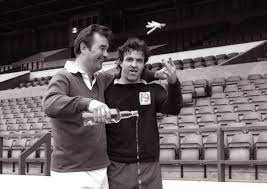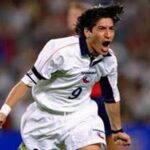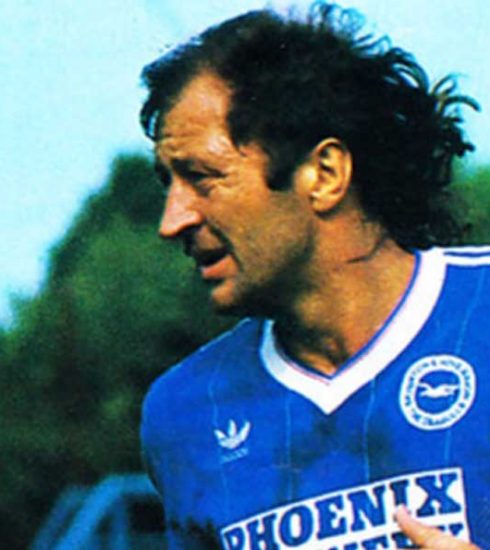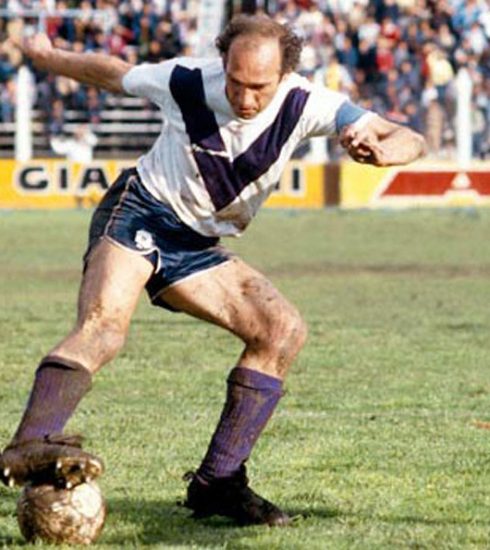JOHN ROBERTSON: I owe everything to Brian Clough



“I owe him everything.
Everything has changed since he came in. For the club and for me.
We were at the bottom of the English Second Division table.
And with the bad feeling that we hadn’t yet touched rock bottom.
I was in and out of the team and when I played I did it out of position.
They were asking me to do things I don’t know how to do.
And there are many things I can’t do on a football pitch!
For example, I can’t run, I can’t do tackles and I can’t hit with my head.
In short, neither I nor the club had a direction, a line or an idea.
Then he came along.
Brian Clough.
After two weeks he had already decided who would have a future with him at Nottingham Forest and who would not.
He decided, to the surprise of many, that I was part of the first group.
“As long as you stop eating junk food, drink a bit less, stop smoking, go to bed earlier at night, get at least 5 kh down and start training seriously,” he told me.
Nothing!
But I trusted him and started to get serious.
Believe it or not, I did everything the Boss advised me to do!
Well… almost everything.
With my beloved ‘fags’, the cigarettes, I just can’t do it!
To go an hour without smoking is torture for me.
So I arrive on the pitch last to have one, or halfway through training I ask to go to the bathroom to have a puff.
There has been a lot of talk for years about Brian Clough, his methods, his style, his character and his incredible achievements with two provincial teams like Derby County first and Nottingham Forest now.
They also talk about how things went at Leeds … my guess is they’re still eating their hands off over there for letting him slip away like that!
Shall I tell you his secret?
It only takes Clough a few days to understand the ins and outs of a footballer.
After that he simply demands that you do what you KNOW how to do and stop doing what you DON’T know how to do.
To yours truly, John Neilson Robertson, it changed my life.
First he told me ‘son, if you are a central midfielder I am Frank Sinatra’.
And he immediately put me on the left wing.
Then he told me that it was forbidden for me to go back into my own half, it was forbidden for me to chase opponents and it was forbidden for me to tackle and slide.
Then he told me that I had to wait for the ball, or rather, PRETEND that they pass me the ball and then score a few goals and many, many crosses.
He added that my staying in the team depended on how many crosses I would make per game.
He put me on the left wing and since then I have always played in that role and always as a starter.
Tomorrow we leave for Munich.
In three days, on 30 May, we will play the final of the European Cup.
To think that two years ago at this time we were celebrating promotion to the English First Division!
For Clough it is a dream come true.
He never mentioned it to us but we all know very well that he never digested the semi-final defeat a few years ago against the Italians of Juventus with his Derby County.
They give us as favourites and that’s fair enough.
We personally eliminated two of the big favourites for the final victory.
Liverpool in the first round and the Germans from Cologne in the semi-final.
The two challenges against the Germans were incredible.
To think that I had almost decided not to play …
The Saturday before the first match against Cologne we played Chelsea in London.
We won 3-1.
After the game with a friend and our wives we went to a restaurant.
A few minutes after we got home the phone rang.
It was two o’clock in the morning.
On the other end of the line is my brother-in-law.
“John, I have terrible news to tell you.”
I immediately thought of my father, who had long had heart problems.
“It’s daddy isn’t it ?” I asked him.
“No John, your brother Hughie and Isobel died. In a car accident.”
They were both 35 and had an 8 year old daughter, Gillian who was in the back seat and was virtually unharmed.
They died in the old Vauxall Viva that I had given them after Brian Clough had managed to get them all a brand new Toyota Celica after our championship win.
The next day I called Clough.
I knew very well how much this match meant to him.
A Champions Cup semi-final where he wanted at all costs to go and get what he had unfairly been denied a few years earlier.
But the only thing the Boss said to me was, ‘Do what you feel like doing son. I stand by you and offer my condolences’.
… This is what Clough said to me before the most important game of his career.
His first thought was of me.
How can you not love this man?!?!

So on the Monday we buried my brother and his wife.
The next day I returned to Nottingham and on the following day I took the field at the City Ground against Cologne in the semi-final first leg of the European Cup.
It was the most beautiful, gripping and exciting game I have ever been a part of.
This despite the fact that the pitch was reduced to a bog.
After barely twenty minutes of the game we were already losing 2-0.
The game and qualification seemed already compromised.
Instead we started to play, create chances and crush the Germans in their own area.
When Birtles scored the goal of 1:2 with which we went into the locker room, we realised that we could still do something good.
Then it was Bowyer who brought us back on level terms and halfway through the second half a real football miracle happened.
I scored the 3-2 goal myself, but the incredible thing was that I scored with my head, and on the dive!
The first goal in my entire career that I scored with my head!
I rolled my eyes… ‘Hughie had a hand in it,’ I thought.
But the Germans managed to equalise before the end of the period, and with the 3-3 final, not many people were giving us a chance in the return match in Cologne.
And instead we did it! One-nil, Ian Bowyer’s goal and in three days’ time we will be able to crown the dream of an entire career, that of climbing onto the roof of Europe.
… after all Brian Clough has done for me … well, I hope I can help him achieve it.
Even if he keeps calling me ‘Super Tramp’!
John Neilson Robertson was born on 20 January 1953 in the Scottish town of Uddingston.
At the age of 17, in May 1970, he arrived at Nottingham Forest, who put him under contract and after a few months, in October 1970, made him debut in the first team.
Technique and game vision were first-rate, but what seemed to be a career destined for the top ranks of British football suddenly stalled.
The relationship with the then Nottingham manager Allan Brown is certainly not idyllic.
John, who is anything but a ‘natural’ athlete, is accused of lacking commitment in training and putting little ‘heart’ into it on the pitch.
He is employed as a central midfielder, but his shortcomings in this role are obvious: poor running, almost no ability to cover and very limited physical endurance.
He began to sit on the bench more and more often and when Brian Clough arrived on the bench of Nottingham Forest in January 1975, he even found him on the transfer list … with only Partick Thistle as an interested club.
“Old Big ‘Ead” (one of Clough’s many nicknames) takes a few weeks to realise that:
(a) Robertson is playing out of position and that he is not a central midfielder
b) that the few things he can do, dribble past opponents and cross, he can do better than anyone else.
Clough knows how to strike the right chords and John Robertson responds in a big way.
He quickly becomes the fulcrum of the team.
He doesn’t have to exhaust himself in useless chasing after opponents but has to stay in the last 30 metres of the pitch, get the ball and ‘invent’.
‘Our Picasso’ Clough will call him on more than one occasion.
But Robertson has another characteristic that makes him virtually impossible to mark: he is absolutely ambidextrous.
He kicks with indifferent skill with his right and left foot and with the same devastating accuracy.
Two definitive examples of this peculiarity of his: just look at the two goals with which Nottingham Forest would win their two consecutive European Cups.
1979 vs Malmoe. Robertson received the ball on the left out, skipped past his direct opponent on the outside, avoided a second opponent’s double and from the back line brushed a wonderful left-footed cross onto the second post which Trevor Francis only had to push into the net.
1980 vs Hamburg. Robertson receives the ball on the left wing. He pretends to aim for the back line but instead goes back towards the centre. He calls for a one-two with Birtles, receives the ball, skips past Keegan and fires a pinpoint right-footer that fizzes in to the German keeper’s left after caressing the post.
Clough and Taylor (who in the meantime had rejoined Forest) never hid their fondness for ‘that fat guy who plays with No. 11’ as Clough himself often called him.
So much so that it was John Robertson who was to be the cause of the total breakdown in relations between Clough and Taylor a few years later.
It so happened that in 1983, when Taylor became manager of Derby County (Clough’s former team and Forest’s bitter rivals), after a ruthless courtship and an excellent financial offer, he managed to poach John Robertson from Nottingham Forest, with whom he was discussing a contract renewal at the time.
The fact that Taylor had contacted Robertson without even informing Clough was never accepted by the fiery Middlesbrough manager.
The relationship was never settled until Taylor’s own death only seven years later in October 1990.
However, John Robertson, also due to many injuries, never managed with the Rams to express himself at the level he had accustomed everyone in Nottingham to.
In 1985 Derby County released him and ‘Robbo’ made a romantic return to Nottingham Forest, but unfortunately confirmed that his best days were behind him.
A dozen games before he finished his fantastic football career in semi-professional teams.
His experience, however, was put to good use in the following years.
For twenty years, John Robertson was the right-hand man of one of the greatest British coaches of this century: the Northern Irishman Martin O’Neill, his old teammate at Nottingham, with whom he shared among others splendid experiences on the benches of Leicester, Aston Villa and especially Celtic Glasgow.
It was precisely the period at Celtic Glasgow that Robertson described as ‘my best years in football’ … he who was a huge Glasgow Rangers fan!
If Robertson had a lot from the pitch, the same cannot be said of his private life, which was anything but fortunate outside the playing field.
Besides the accident in which his brother and sister-in-law perished and losing his father the following year, John also had to endure the worst possible tragedy for a father.
Burying a daughter, little Jessie, born with a brain malformation and quadriplegic, who died at an early age.
“I think about my little Jessie every single day. And every day that I can I go to the cemetery and spend at least five minutes talking to her”.
At little Jessie’s funeral those who were present that day saw John placing a small letter in the coffin beside his daughter.
He will not reveal the contents to anyone.
He will only say, and many years later, that the gist of that note was ‘Thank you, my little one, for choosing me as your daddy’ …
Robertson also suffered a heart attack in 2013 (while playing tennis, one of his great passions) from which he recovered perfectly and which, as he recalls at every opportunity, ‘was what I needed to finally decide to give up my beloved cigarettes!
To conclude, a fact that perhaps more than any other can give an idea of the value of this great footballer who most probably did not get the recognition, especially international, that he deserved.
In 2015, a poll of Nottingham Forest fans voted him ‘Best player in Nottingham Forest history’.
Not bad for a ‘fat guy who can’t run, doesn’t counter-attack and doesn’t hit with his head’.

ANECDOTES AND TRIVIA
Brian Clough has never hidden his fondness for Robertson. Even though he has often made him the subject of many of his proverbial jokes.
Clough 1: ‘John Robertson really is an unattractive man. He looks like a tramp at times but for me personally he is very useful. On days when I’m feeling particularly off or down I go and sit next to him. I look at him and an instant later I feel like Paul Newman!”
Clough 2: Clough as mentioned kept telling his people to pass the ball as soon as possible “to that fat guy with number 11″. After a while this began to annoy Martin O’Neill, who, playing on the wing on the opposite side, was rarely involved in the game. Finally one fine day O’Neill decided to broach the subject with Brian Clough: ‘Boss, but we can’t always just play on the left. Sometimes you have to give the ball to me too!” was Martin O’Neill’s lament.
“Why should we give the ball to you when there is a genius on the other flank ?”.
End of discussion.
Clough 3: During his last and unsuccessful stint at Nottingham during a match with Luton between the first and second half Clough turns to Robertson “Robbo, if you want you can have a cigarette before you get back on the pitch”.
“Thanks Boss !” replied Robertson who then resumed “I’m amazed though. He’s never let me do that before.”
“It’s just to see if at least this will help, because worse than you’ve played so far is impossible!!!” an enraged Clough barked at him.
Clough, however, could recognise all his talent. More than once he said of Robertson:
‘Give him a ball and a yard of space and he becomes an artist: the Picasso of football’.
Of course, again from Clough, there is another amusing version that always involves a great painter.
During a chat with the famous commentator Brian More Clough is singing Robertson’s praises.
Brian Moore, somewhat puzzled, replies to him “I honestly don’t see all the qualities you tell me Brian” and then adds “He’s chubby, a bit clumsy, slow … in short he doesn’t even look like a footballer !” Brian Clough’s response is not long in coming. “True Brian. But Van Gogh didn’t look like a painter either. But he was the greatest of them all.
Finally, again from Clough, an anecdote about Robertson directly from the autobiography of the great English manager.
“During a pre-season tour of Germany I send the starting eleven out for their pre-match warm-up.
I count them up and realise Robertson is missing.
I go down to the changing room and find him sitting on a bench literally ‘scratching his balls’. I shout at him about everything.
“You’re a disgrace John. The others are out on the field running and you’re out here dicking around. You can’t run, you can’t jump … you can’t even swim ! You can’t stand the sunshine and we can’t get you out of bed in the morning.”
But Clough concludes: “I only put up with you because you’re a fucking genius!
Clough’s description of his ‘loveliness’ by teammate Kenny Burns is amusing.
“Robbo never goes to the supermarket. He’s got so many wrinkles on his face that every time he gets near the till the little machine that reads the Barcode starts up!”
In May 1981 we play for the sadly defunct inter-British tournament what for the Scots is ‘the match of matches’. The one against “the Auld Enemy”. England.
It is played at Wembley and for the Scottish fans it is a real pilgrimage.
To win at Wembley against the English is simply priceless.
The game is locked at 0-0 when there is a penalty kick for Scotland midway through the second half.
John Robertson has the ball delivered.
But as he is placing it on the penalty spot Trevor Francis, England striker and his teammate at Nottingham approaches Corrigan, the English goalkeeper.
He whispers something in his ear.
Evidently advising him where his team-mate would have taken the penalty kick.
John Robertson takes the run-up and shoots.
Ball to the left and Corrigan at the other end.
“Trevor’s bluff didn’t work. I shot it exactly where I always shoot them and they probably expected otherwise. Robertson recalled amused.
Adding, “Of course at the end of the game I thought about it … if I had missed it I could never get back beyond Hadrian’s Wall !”
Finally, the last pearl is from John Robertson himself.
“Everyone has always made fun of my appearance.
And to think that I’ve always done everything I could to look like my great idol Brian Ferry, the lead singer of Roxy Music … it didn’t go so well, did it?”

The one on John Robertson is one of 27 biographies told in – https://www.urbone.eu/products/mavericks-cult-heroes-del-calcio-britannico-27-biografie-di-calciatori-che-hanno-in-qualche-modo-lasciato-il-segno-nella-storia-del-calcio-britannico-degli-ultimi-cinquantanni





